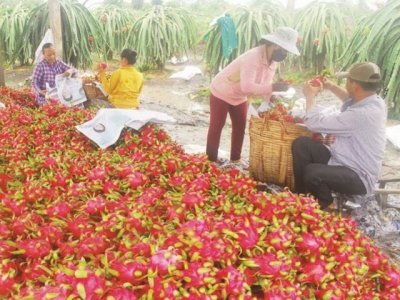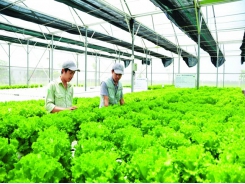Exporting agricultural products to China: Do not use wheelbarrow

The export of agricultural products to the Chinese market recorded a significant decline since the beginning of the year. The stringent requirements from China have required significant changes for Vietnamese products in order to develop in this billion-populationmarket.
The market share for promoting agricultural exports to the Chinese market is very large. Photo: ST.
Decrease over 10%
According to the General Department of Customs (Ministry of Finance),in the first nine months of this year, export turnover of agricultural products (including vegetables, cashews, pepper, tea, coffee, rice, cassava and cassava products, rubber) of the country reached $12.54 billion, down 7.9% compared to the same period in 2018. Of which, China remained the largest import market of Vietnam's agricultural products with $4.25 billion, down 10.6% over the same period last year.
A typical example of declining exports to the Chinese market is vegetables and fruit. In the first nine months, China still ranked first in exports, with 67.7% market share. Vietnam's vegetable and fruit export to China was only $1.9 billion, down to 13.5% compared to the same period in 2018.
Mr. Dang Phuc Nguyen, General Secretary of Vietnam Fruit and Vegetable Association saidalthough exportsof vegetables and fruits to other markets like EU, USA, Korea and Japan increased strongly, it was not enough to compensate for the decrease in exports to the Chinese market. This comes from the fact that sincethe beginning of the year, China has implemented traceability for imported vegetables and fruits, and at the same time tightened import quotas. In addition, China requires VietGAP-certified products; having packing facilities to ensure hygiene and safety. "Enterprises have not been able to adapt to meet the requirements, causing the export turnover to China to decrease," Mr. Nguyen said.
Talking at the seminar "Promoting the official export of agricultural products to the Chinese market" organized by People's Deputies Newspaper on November 14, in Hanoi, Mr. Le ThanhHoa, Deputy Director of the Department of Processing and Development Agricultural market (Ministry of Agriculture and Rural Development) said China is a big market, the ability to import agricultural products is very large but Vietnam only meets a very small part, less than 2% of total import turnover of China. That means the market space is still large.
“However, China requires very strict risk assessments, from monitoring of processing hazards, to making final products. These processes are applied by China as developed countries likethe US and EU. Notably, China requires enterprises to set up their own monitoring process and enterprises must understand that process and focus on food safety review in raw materials, processing, and strict supervision,” Mr. Hoa emphasized.
Do not transport goods by "wheelbarrow"
As a person with many years of experiencein agriculture and rural areas, agricultural expert Hoang TrongThuysaid: Currently, China has 50% of well-off households, so China's consumption trends are changing drastically. Therefore, the tightening of imports is natural, in line with international practices. “With the drastic changes in China's policies of import management, it is time for businesses and farmers to change their habitsto meet the requirements. Enterprises must be the leader in building the value chain, there must be enterprises large enough to gather farmers in chains. If we keep using "wheelbarrows" to bring agricultural products to the world, it is easy to be sunk by big ships,"said Hoang TrongThuy.
Mr. Nguyen DucKien, Deputy Chairman of the National Assembly's Economic Committee, commented: “The changes of China's import policy are indispensable. Through our research, we basically see that only the large enterprises, which have economic potential, can analyze the market, and successfully approach the Chinese market. We have to look back on ourselves, look back on the market we are aiming then make changes for suitability.”
Mr. Le ThanhHoaalso said: Currently, the Ministry of Agriculture and Rural Development is continuing to negotiate with the Chinese functional industry to have more agricultural products officially exported to this market.First of all are sweet potatoes, black jelly and durian. For animal products, from the success of dairy products, the Ministry of Agriculture and Rural Development will continue to coordinate the assessment of disease-free areas, food safety and hygiene surveillance to be able to export pork, poultry and bird's nests to China in the near future.
Có thể bạn quan tâm
Phần mềm

Phối trộn thức ăn chăn nuôi

Pha dung dịch thủy canh

Định mức cho tôm ăn

Phối trộn phân bón NPK

Xác định tỷ lệ tôm sống

Chuyển đổi đơn vị phân bón

Xác định công suất sục khí

Chuyển đổi đơn vị tôm

Tính diện tích nhà kính

Tính thể tích ao hồ



 Bac Giang builds organic farming model
Bac Giang builds organic farming model  Farmers expect bumper watermelon for Tet
Farmers expect bumper watermelon for Tet